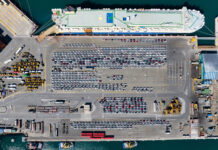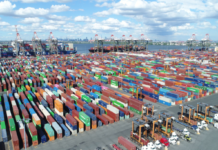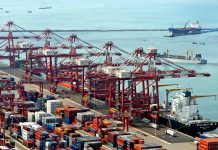Port of Dover’s press release:
Britain’s ongoing reliance on Dover has been highlighted again with the cost of trying to divert traffic to other UK ports calculated to be around £2.5 billion.
Dover handles more international lorries than all other UK ports combined. Up to 110 miles of freight traffic pass through the port every day, taking advantage of the 120 ferry sailings a day on the shortest sea crossing to Europe.
With around half of the UK’s trade being with the European Union and with the just-in-time supply chains that flow between them keeping factories busy and shops full, delivering a frictionless solution at Dover is vital.
That message has been heard loud and clear with Britain’s reliance on frictionless trade at Dover firmly accepted by the Government along with the need to preserve it.
Tim Reardon, Head of EU Exit, Port of Dover, said: “It is clearly good news that the Government recognises the need to keep traffic flowing through Dover, not just for the port but for everyone who relies on the goods in the lorries. Trying to divert the traffic through other ports is a non-starter. The port capacity isn’t there, and a whole new fleet of ferries would be needed which simply doesn’t exist.
“Successful future trade with Europe must be about delivering a realistic solution. That means a free-flowing Dover, whose speed, efficiency and capacity cannot be replicated without adding significant cost to the supply chain.”
Dover has also been at the centre of contingency planning to minimize disruption in the event of a No-Deal Brexit. The Port has been working with Government for months to deliver the plan, outlined in last October’s Customs Bill White Paper, for lorry traffic to be pre-notified to customs so that vehicles do not need to be held at the port.
The first fruits of that work can be seen in the Technical Notices published by the Government on 24 September, which stated that health controls on animal and plant products from the EU would be carried out remotely, so that vehicles would not need to stop at the port.
Mr Reardon added: “We are determined that our customers can continue to rely on Dover, so that their customers can keep factories busy, shops full and prices low for consumers across the UK.”
Deal or no deal, Dover’s success will be Britain’s success – the solution is here.





